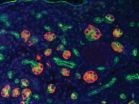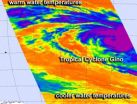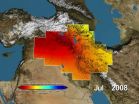(Press-News.org) A multi-site clinical trial including the University of Colorado Cancer Center shows that the benefit of Bright IDEAS problem-solving skills training goes beyond teaching parents to navigate the complex medical, educational, and other systems that accompany a child's diagnosis of cancer – the training also leads to durable reduction in mothers' levels of anxiety and symptoms of posttraumatic stress, and improves overall coping with a child's illness. Results of the study were published online last week in the Journal of Clinical Oncology.
"Earlier research shows that a mom is the keystone of a family. After a child's cancer diagnosis, if mom is stressed and not coping, you see the effects on the marriage and on siblings as well," says Diane Fairclough, DrPH, MSPH, CU Cancer Center investigator and director of the Analytics Core at the Colorado Health Outcomes Center.
Support the mother and you support the family, including the ill child.
A previous clinical trial had shown the effectiveness of the Bright IDEAS problem-solving skills training, and the current study hoped to disentangle the benefits of the training from the simple, potentially powerful effect of a mother's interaction with a compassionate listener. Was it Bright IDEAS specifically or the byproducts of compassion and understanding once a week for eight weeks that led to mothers' gains?
The results of this multi-site, 309-mother study are interesting: immediately after Bright IDEAS training, mothers showed the same gains as with another intervention called nondirective support, which is effectively compassionate listening. But three months later, the gains from Bright IDEAS remained, while the gains from an understanding ear evaporated. In fact, at the three-month mark, the benefits from problem-solving skills training were growing – not only were mothers more adept problem-solvers, but this increased ability transferred to ever-more gains in mood, decreased anxiety and fewer symptoms of posttraumatic stress.
You know the phrase, If you give a man a fish you feed him for a day, but if you teach a man to fish, you feed him for a lifetime. In this study, it was as if Bright IDEAS taught mothers to fish – not only helping mothers, but helping mothers learn to help themselves.
"I've been a cancer patient myself," Fairclough says, "and I think the most stressing thing is that there's a sense that the disease has taken over your life. It defines your schedule, your family vacations, you can't change employers because of insurance concerns. I think problem-solving skills training helps mothers pull back some control after their child's diagnosis. It makes things seem manageable and gives parents a sense they're not just helpless observers."
###
The group also includes members from the University of Rochester, M.D. Anderson Cancer Center, University of Texas El Paso, Miller Children's Hospital Long Beach, Children's Hospital Los Angeles, Children's Hospital of Pittsburgh, and St. Jude Children's Research Hospital. To date, the training has required eight weekly individual meetings between a mother and her trainer. This approach, while successful, is resource intensive. This past summer, the research group received funding from the National Cancer Institute to develop a web-based version to make Bright IDEAS available anytime, wherever a parent or other caregiver has access to the Internet.
For more information and free downloads of the 8-session training, including instruction manuals, workbooks and worksheets in English and Spanish, visit the Research-Tested Intervention Programs page hosted by the National Cancer Institute or contact O.J. Sahler, MD, the Principal Investigator of the project, at OJ_Sahler@urmc.rochester.edu.
Study shows that problem-solving training helps mothers cope with child's cancer diagnosis
BRIGHT Ideas training reduces posttrauamtic stress in mothers of children diagnosed with cancer: materials available for free download and immediate use!
2013-02-13
ELSE PRESS RELEASES FROM THIS DATE:
Molecular master switch for pancreatic cancer identified, potential predictor of treatment outcome
2013-02-13
PHILADELPHIA – A recently described master regulator protein may explain the development of aberrant cell growth in the pancreas spurred by inflammation
A team from the Perelman School of Medicine at the University of Pennsylvania profiled gene expression of mouse pancreatic ductal and duct-like cells from different states - embryonic development, acute pancreatitis and K-ras mutation-driven carcinogenesis - to find the molecular regulation of these processes.
Broadly speaking, two cellular compartments are important in a normal pancreas, endocrine cells, which produce ...
Marketing technique: Activating gender stereotypes just to knock 'em down
2013-02-13
In certain circles, such as publishing, it has been well-documented that female authors have taken male pen names to attract a larger audience and/or get their book published. But should marketers actually highlight gender and activate stereotypes to sell more products?
A new study by USC Marshall Professor Valerie Folkes and Ohio State University Professor Shashi Matta looks at the issue of product perception of consumers through the lens of gender stereotypes. The researchers conclude that while traditional gender stereotypes can still have a significant influence on ...
Cities can reduce greenhouse gas emissions by 70 percent, says U of T researcher
2013-02-13
TORONTO, ON – Cities around the world can significantly reduce greenhouse gas (GHG) emissions by implementing aggressive but practical policy changes, says a new study by University of Toronto Civil Engineering Professor Chris Kennedy and World Bank climate change specialist Lorraine Sugar, one of Kennedy's former students.
Kennedy and Sugar make the claim in 'A low carbon infrastructure plan for Toronto, Canada,' published in the latest issue of The Canadian Journal of Civil Engineering. The paper aims to show how cities can make a positive difference using realistic, ...
Stanford scientist uncovers the reproductive workings of a harvester ant dynasty
2013-02-13
Ants are just about everywhere you look, and yet it's largely unknown how they manage to be so ubiquitous. Scientists have understood the carnal mechanism of ant reproduction, but until now have known little of how successful the daughters of a colony are when they attempt to found new colonies.
For the first time, Stanford biologists have been able to identify specific parent ants and their own children in wild ant colonies, making it possible to study reproduction trends.
And in a remarkable display of longevity, an original queen ant was found to be producing new ...
Major clinical trial finds no link between genetic risk factors and 2 top wet AMD treatments
2013-02-13
SAN FRANCISCO – February 12, 2013 – New findings from a landmark clinical trial show that although certain gene variants may predict whether a person is likely to develop age-related macular degeneration (AMD), a potentially blinding eye disease that afflicts more than nine million Americans, these genes do not predict how patients will respond to Lucentis™ and Avastin™, the two medications most widely used to treat the "wet" form of AMD. This new data from the Comparison of AMD Treatment Trials (CATT), published online in Ophthalmology, the journal of the American Academy ...
Explosive breakthrough in research on molecular recognition
2013-02-13
Edmonton—Ever wonder how sometimes people still get through security with explosives on their person? Research done in the University of Alberta's Department of Chemical and Materials Engineering has revealed a new way to better detect these molecules associated with explosive mixtures.
A team of researchers including post-doctoral fellows Seonghwan Kim, Dongkyu Lee and Xuchen Liu, with research associate Charles Van Neste, visiting professor, Sangmin Jeon from the Pohang University of Science and Technology (South Korea), and Department of Chemical and Materials Engineering ...
Lower autism risk with folic acid supplements in pregnancy
2013-02-13
Women who took folic acid supplements in early pregnancy almost halved the risk of having a child with autism. Beginning to take folic acid supplements later in pregnancy did not reduce the risk. This is shown in new findings from the ABC Study and Norwegian Mother and Child Cohort Study published in the Journal of The American Medical Association (JAMA).
Women who took folic acid supplements from four weeks before conception to eight weeks into pregnancy had a 40 per cent lower risk of giving birth to children with childhood autism (classic autism). Use of folic acid ...
NASA sees Cyclone Gino wind up to wind down later
2013-02-13
NASA's Aqua satellite passed over Cyclone Gino as the storm continues to wind up in the southern Indian Ocean, consolidating and strengthening. Infrared data shows the storm has strengthened but it is headed for cooler waters which will weaken it in coming days.
On Feb. 12 at 0841 UTC, NASA Atmospheric Infrared Sounder (AIRS) instrument that flies aboard the Aqua satellite captured infrared imagery of Cyclone Gino that showed the storm developed a large area of very cold, high cloud top temperatures around its center indicating powerful thunderstorms. Cloud top temperatures ...
NASA provides satellite views of nor'easter lifespan
2013-02-13
NASA and NOAA satellites have provided animations and images of the coupling of two low pressure areas that created the now historic winter-time nor'easter that brought more than two feet of snow to portions of the New England states on Feb. 8 and 9, 2013. NASA released an animation of NOAA satellite imagery that shows the lifetime of the historic nor'easter.
The nor'easter dropped between 2 and 3 feet of snowfall over the U.S. Northeast and left more than 650,000 without power in eight states, according to the Associated Press. Several governors established travel bans ...
NASA satellites find freshwater losses in Middle East
2013-02-13
A new study using data from a pair of gravity-measuring NASA satellites finds that large parts of the arid Middle East region lost freshwater reserves rapidly during the past decade.
Scientists at the University of California, Irvine; NASA's Goddard Space Flight Center in Greenbelt, Md.; and the National Center for Atmospheric Research in Boulder, Colo., found during a seven-year period beginning in 2003 that parts of Turkey, Syria, Iraq and Iran along the Tigris and Euphrates river basins lost 117 million acre feet (144 cubic kilometers) of total stored freshwater. That ...
LAST 30 PRESS RELEASES:
Scientists show how to predict world’s deadly scorpion hotspots
ASU researchers to lead AAAS panel on water insecurity in the United States
ASU professor Anne Stone to present at AAAS Conference in Phoenix on ancient origins of modern disease
Proposals for exploring viruses and skin as the next experimental quantum frontiers share US$30,000 science award
ASU researchers showcase scalable tech solutions for older adults living alone with cognitive decline at AAAS 2026
Scientists identify smooth regional trends in fruit fly survival strategies
Antipathy toward snakes? Your parents likely talked you into that at an early age
Sylvester Cancer Tip Sheet for Feb. 2026
Online exposure to medical misinformation concentrated among older adults
Telehealth improves access to genetic services for adult survivors of childhood cancers
Outdated mortality benchmarks risk missing early signs of famine and delay recognizing mass starvation
Newly discovered bacterium converts carbon dioxide into chemicals using electricity
Flipping and reversing mini-proteins could improve disease treatment
Scientists reveal major hidden source of atmospheric nitrogen pollution in fragile lake basin
Biochar emerges as a powerful tool for soil carbon neutrality and climate mitigation
Tiny cell messengers show big promise for safer protein and gene delivery
AMS releases statement regarding the decision to rescind EPA’s 2009 Endangerment Finding
Parents’ alcohol and drug use influences their children’s consumption, research shows
Modular assembly of chiral nitrogen-bridged rings achieved by palladium-catalyzed diastereoselective and enantioselective cascade cyclization reactions
Promoting civic engagement
AMS Science Preview: Hurricane slowdown, school snow days
Deforestation in the Amazon raises the surface temperature by 3 °C during the dry season
Model more accurately maps the impact of frost on corn crops
How did humans develop sharp vision? Lab-grown retinas show likely answer
Sour grapes? Taste, experience of sour foods depends on individual consumer
At AAAS, professor Krystal Tsosie argues the future of science must be Indigenous-led
From the lab to the living room: Decoding Parkinson’s patients movements in the real world
Research advances in porous materials, as highlighted in the 2025 Nobel Prize in Chemistry
Sally C. Morton, executive vice president of ASU Knowledge Enterprise, presents a bold and practical framework for moving research from discovery to real-world impact
Biochemical parameters in patients with diabetic nephropathy versus individuals with diabetes alone, non-diabetic nephropathy, and healthy controls
[Press-News.org] Study shows that problem-solving training helps mothers cope with child's cancer diagnosisBRIGHT Ideas training reduces posttrauamtic stress in mothers of children diagnosed with cancer: materials available for free download and immediate use!



